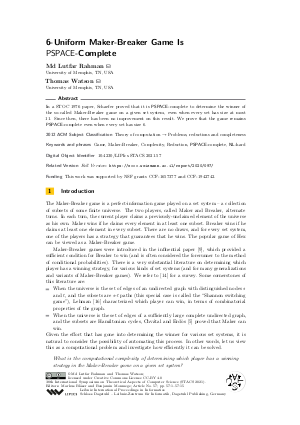6-Uniform Maker-Breaker Game Is PSPACE-Complete
Authors Md Lutfar Rahman, Thomas Watson
-
Part of:
Volume:
38th International Symposium on Theoretical Aspects of Computer Science (STACS 2021)
Part of: Series: Leibniz International Proceedings in Informatics (LIPIcs)
Part of: Conference: Symposium on Theoretical Aspects of Computer Science (STACS) - License:
 Creative Commons Attribution 4.0 International license
Creative Commons Attribution 4.0 International license
- Publication Date: 2021-03-10
File

PDF
LIPIcs.STACS.2021.57.pdf
- Filesize: 0.66 MB
- 15 pages
Document Identifiers
Related Versions
- Full Version https://eccc.weizmann.ac.il/report/2020/097/
Subject Classification
ACM Subject Classification
- Theory of computation → Problems, reductions and completeness
Keywords
- Game
- Maker-Breaker
- Complexity
- Reduction
- PSPACE-complete
- NL-hard
Metrics
- Access Statistics
-
Total Accesses (updated on a weekly basis)
0Document
0Metadata
Abstract
In a STOC 1976 paper, Schaefer proved that it is PSPACE-complete to determine the winner of the so-called Maker-Breaker game on a given set system, even when every set has size at most 11. Since then, there has been no improvement on this result. We prove that the game remains PSPACE-complete even when every set has size 6.
Cite As Get BibTex
Md Lutfar Rahman and Thomas Watson. 6-Uniform Maker-Breaker Game Is PSPACE-Complete. In 38th International Symposium on Theoretical Aspects of Computer Science (STACS 2021). Leibniz International Proceedings in Informatics (LIPIcs), Volume 187, pp. 57:1-57:15, Schloss Dagstuhl – Leibniz-Zentrum für Informatik (2021)
https://doi.org/10.4230/LIPIcs.STACS.2021.57
BibTex
@InProceedings{rahman_et_al:LIPIcs.STACS.2021.57,
author = {Rahman, Md Lutfar and Watson, Thomas},
title = {{6-Uniform Maker-Breaker Game Is PSPACE-Complete}},
booktitle = {38th International Symposium on Theoretical Aspects of Computer Science (STACS 2021)},
pages = {57:1--57:15},
series = {Leibniz International Proceedings in Informatics (LIPIcs)},
ISBN = {978-3-95977-180-1},
ISSN = {1868-8969},
year = {2021},
volume = {187},
editor = {Bl\"{a}ser, Markus and Monmege, Benjamin},
publisher = {Schloss Dagstuhl -- Leibniz-Zentrum f{\"u}r Informatik},
address = {Dagstuhl, Germany},
URL = {https://drops.dagstuhl.de/entities/document/10.4230/LIPIcs.STACS.2021.57},
URN = {urn:nbn:de:0030-drops-137020},
doi = {10.4230/LIPIcs.STACS.2021.57},
annote = {Keywords: Game, Maker-Breaker, Complexity, Reduction, PSPACE-complete, NL-hard}
}
Author Details
Funding
This work was supported by NSF grants CCF-1657377 and CCF-1942742.
References
-
Argimiro Arratia and Iain Stewart. A note on first-order projections and games. Theoretical Computer Science, 290(3):2085-2093, 2003.

-
Bengt Aspvall, Michael Plass, and Robert Tarjan. A linear-time algorithm for testing the truth of certain quantified boolean formulas. Information Processing Letters, 8(3):121-123, 1979.

-
Boštjan Brešar, Paul Dorbec, Sandi Klavžar, Gašper Košmrlj, and Gabriel Renault. Complexity of the game domination problem. Theoretical Computer Science, 648:1-7, 2016.

-
Jesper Byskov. Maker-Maker and Maker-Breaker games are PSPACE-complete. Technical Report RS-04-14, BRICS, Department of Computer Science, Aarhus University, 2004.

-
Vasek Chvátal and Paul Erdös. Biased positional games. Annals of Discrete Mathematics, 2:221-229, 1978.

-
Eurinardo Costa, Victor Lage Pessoa, Rudini Menezes Sampaio, and Ronan Soares. PSPACE-hardness of two graph coloring games. In Proceedings of the 10th Latin and American Algorithms, Graphs, and Optimization Symposium (LAGOS), pages 333-344. Elsevier, 2019.

-
Erik Demaine and Robert Hearn. Constraint logic: A uniform framework for modeling computation as games. In Proceedings of the 23rd Conference on Computational Complexity (CCC), pages 149-162. IEEE, 2008.

-
Eric Duchene, Valentin Gledel, Aline Parreau, and Gabriel Renault. Maker-breaker domination game. Discrete Mathematics, 343(9):111955, 2020.

-
Paul Erdös and John Selfridge. On a combinatorial game. Journal of Combinatorial Theory, Series A, 14(3), 1973.

-
Stephen Fenner, Daniel Grier, Jochen Messner, Luke Schaeffer, and Thomas Thierauf. Game values and computational complexity: An analysis via black-white combinatorial games. In Proceedings of the 26th International Symposium on Algorithms and Computation (ISAAC), pages 689-699. Springer, 2015.

-
Aviezri Fraenkel and Elisheva Goldschmidt. PSPACE-hardness of some combinatorial games. Journal of Combinatorial Theory, Series A, 46(1):21-38, 1987.

-
Valentin Gledel, Michael A Henning, Vesna Iršič, and Sandi Klavžar. Maker-breaker total domination game. Discrete Applied Mathematics, 282:96-107, 2020.

-
Robert Hearn. Amazons, Konane, and Cross Purposes are PSPACE-complete. In Games of No Chance 3, Mathematical Sciences Research Institute Publications, pages 287-306. Cambridge University Press, 2009.

-
Dan Hefetz, Michael Krivelevich, Miloš Stojaković, and Tibor Szabó. Positional Games. Birkhäuser Basel (Springer), 2014.

-
Martin Kutz. Weak positional games on hypergraphs of rank three. In Proceedings of the 3rd European Conference on Combinatorics, Graph Theory, and Applications (EuroComb), pages 31-36. Discrete Mathematics & Theoretical Computer Science, 2005.

-
Alfred Lehman. A solution of the Shannon switching game. Journal of the Society for Industrial and Applied Mathematics, 12(4):687-725, 1964.

-
Md Lutfar Rahman and Thomas Watson. Complexity of unordered CNF games. ACM Transactions on Computation Theory, 12(3):18:1-18:18, 2020.

-
Md Lutfar Rahman and Thomas Watson. Tractable unordered 3-CNF games. In Proceedings of the 14th Latin American Theoretical Informatics Symposium (LATIN). Springer, 2020. To appear.

-
Thomas Schaefer. Complexity of decision problems based on finite two-person perfect-information games. In Proceedings of the 8th Symposium on Theory of Computing (STOC), pages 41-49. ACM, 1976.

-
Thomas Schaefer. On the complexity of some two-person perfect-information games. Journal of Computer and System Sciences, 16(2):185-225, 1978.

-
Wolfgang Slany. The complexity of graph Ramsey games. In Proceedings of the 2nd International Conference on Computers and Games (CG), pages 186-203. Springer, 2000.

-
Wolfgang Slany. Endgame problems of Sim-like graph Ramsey avoidance games are PSPACE-complete. Theoretical Computer Science, 289(1):829-843, 2002.

-
Larry Stockmeyer and Albert Meyer. Word problems requiring exponential time. In Proceedings of the 5th Symposium on Theory of Computing (STOC), pages 1-9. ACM, 1973.

-
Sachio Teramoto, Erik Demaine, and Ryuhei Uehara. The Voronoi game on graphs and its complexity. Journal of Graph Algorithms and Applications, 15(4):485-501, 2011.

-
Jan van Rijn and Jonathan Vis. Complexity and retrograde analysis of the game Dou Shou Qi. In Proceedings of the 25th Benelux Conference on Artificial Intelligence (BNAIC), 2013.

